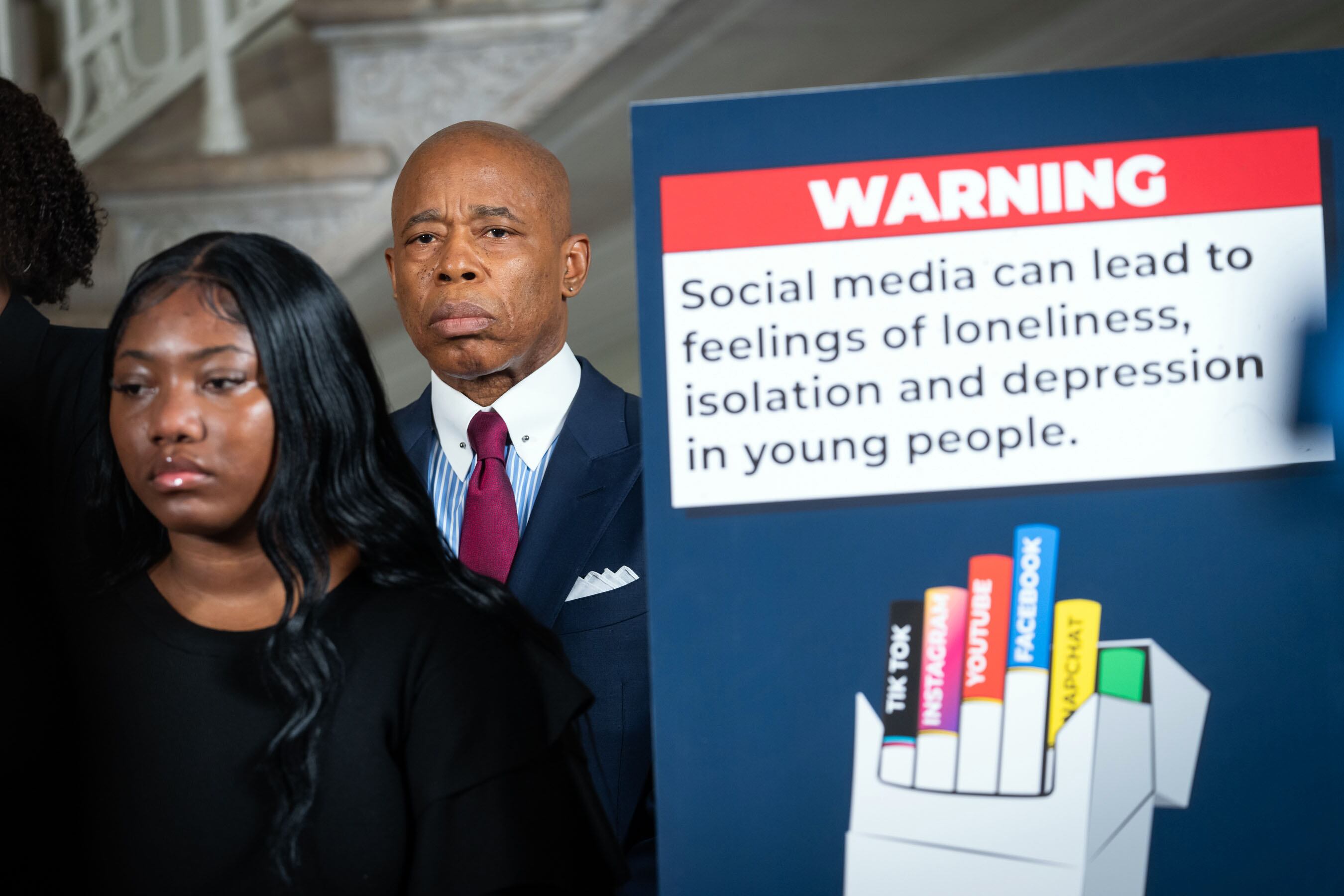Sign up for Chalkbeat New York’s free daily newsletter to keep up with NYC’s public schools.
Mayor Eric Adams ratcheted up New York City’s battle against social media companies on Wednesday, joining hundreds of municipalities and school systems across the country that have filed a wave of lawsuits seeking financial compensation and broader changes to the platforms.
The city contends that social media platforms are designed to be addictive, harming young people’s mental health, and serving as venues for bullying. The lawsuit is calling on the companies to change their practices and pay for youth mental health education prevention and treatment services. Officials said the city spends about $100 million a year on youth mental health programs.
The city’s Education Department and the public hospital system are also part of the suit filed in California state court against the companies operating TikTok, Instagram, Facebook, Snapchat, and YouTube.
“The feature that keeps young people clicking in these dark corners of social media have fueled an alarming rise in online bullying, depression, eating disorders, and suicidal ideation,” Adams said during a briefing on Wednesday. “There is, of course, a great deal of education and positive content out there too. But there is also a 24/7 digital dystopia that even very young children can easily access without parents or caregivers ever being aware of.”
City officials pointed to a series of worrying statistics about youth mental health, including rising rates of suicide attempts. Additionally, the statistics show that in 2021, nearly 38% of high school students felt so hopeless or sad over the previous year that they stopped participating in their usual activities. Still, there is little conclusive evidence linking social media use to mental health problems, though experts have called for more research on the topic.
The burden, however, has been high on the nation’s largest school system, the lawsuit alleges, including hiring additional counselors and social workers, investigating threats made against schools and students over social media, and increasing community-based services such as outpatient therapy and after-school programs. Social media addiction has adversely affected students’ attention spans, their ability to learn, and their behavior, the lawsuit claims, noting that some students have become violent when a teacher tried to take their phones.
Some school leaders have struggled to manage the impact of social media on their campuses. In response to Instagram accounts that allowed students to post anonymous content, a Queens principal threatened to cancel activities and suspend students who followed those accounts, an episode that raised free speech concerns. (The accounts were ultimately taken down.)
The lawsuit claims that the companies borrow “heavily from the behavioral and neurobiological techniques used in slot machines and exploited by the cigarette industry” to keep the attention of young people, who are at a “vulnerable” developmental stage, and to drive advertising revenue.
Last year’s lawsuit against social media companies filed by Seattle’s school district unleashed the current wave of litigation. New York City’s lawsuit appeared to be broadly similar to others filed by local school districts, which some observers say could face tough legal odds.
“Most of these [lawsuits] are as much about legal success as they are about shaping issues and winning in the court of public opinion,” Chris Thomas, a professor at the University of Florida, told EdWeek. “That is part of the strategy around the lawsuits, even if they have tough hills to climb legally.”
Adams has signaled for months that his administration planned to take stronger action against social media companies. Last month, he announced the city would begin to treat social media use as a public health threat, deploying an ad campaign equating major social media platforms with tobacco companies. The city also released an advisory encouraging caregivers to delay giving children a smartphone until age 14 to limit continuous access to social media.
The city vowed to take a series of steps outside of the lawsuit as part of a new “framework for action” including guidance to schools for creating “tech-free zones” and launching a youth advisory council.
City officials have also begun offering free online therapy for teenagers, one of Adams’ biggest mental health initiatives, though some students have struggled to persuade their parents to let them participate. More than 2,000 teens have used the online therapy platform so far, according to a health department spokesperson.
In a response to the city’s lawsuit, Snapchat spokesperson Ashley Adams sought to distance the platform from other social media companies. “Snapchat was intentionally designed to be different from traditional social media,” she wrote, noting the platform does not include a traditional feed “and has no traditional public likes or comments.”
“While we will always have more work to do,” she added, “we feel good about the role Snapchat plays in helping close friends feel connected, happy and prepared as they face the many challenges of adolescence.”
Liza Crenshaw, a spokesperson for Meta, the parent of Instagram and Facebook, said the company has more than 30 tools and features to support teens and their parents. “We want teens to have safe, age-appropriate experiences online,” she said.
Representatives of TikTok and YouTube did not immediately respond for comment.
Alex Zimmerman is a reporter for Chalkbeat New York, covering NYC public schools. Contact Alex at azimmerman@chalkbeat.org.
Amy Zimmer is the bureau chief for Chalkbeat New York. Contact Amy at azimmer@chalkbeat.org.






